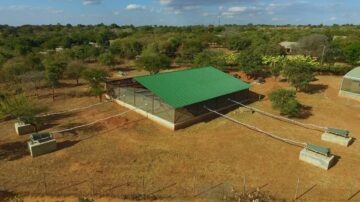Kate Golembiewski at CNN:
 “We were really motivated to try and develop a system where we could study the behavior of the African malaria mosquito in a naturalistic habitat, reflective of its native home in Africa,” McMeniman said. The researchers also wanted to compare the mosquitoes’ smell preferences across different humans, to observe the insects’ ability to track scents across distances of 66 feet (20 meters), and to study them during their most active hours, between 10 p.m. and 2 a.m.
“We were really motivated to try and develop a system where we could study the behavior of the African malaria mosquito in a naturalistic habitat, reflective of its native home in Africa,” McMeniman said. The researchers also wanted to compare the mosquitoes’ smell preferences across different humans, to observe the insects’ ability to track scents across distances of 66 feet (20 meters), and to study them during their most active hours, between 10 p.m. and 2 a.m.
To tick all these boxes, the researchers created a screened facility the size of a skating rink. Dotting the perimeter of the facility were six screened tents where study participants would sleep. Air from their tents, carrying the participants’ unique breath and body odor scents, was pumped through long tubes to the main facility onto absorbent pads, warmed and baited with carbon dioxide to mimic a sleeping human.
More here.
